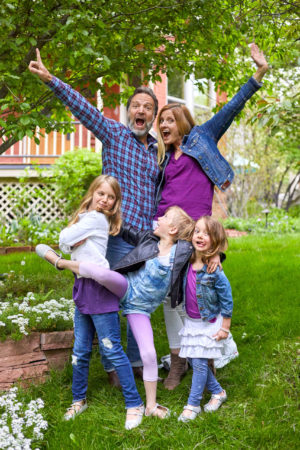
Volunteer Profile: Bill Flagg
Bill Flagg is a full time dad and entrepreneur and he finds volunteering at Friends School to be rewarding. Lou Bendrick sat down with Bill recently to find out what he loves about Friends, why he volunteers, what he’s reading and what’s in his refrigerator.
Read More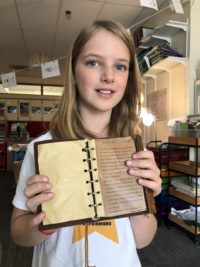
The Immigration Project
Friends actively teaches empathy from preschool through eighth grade. Fifth grade teacher, Emma Thomas, discusses what it looks like to raise critical thinkers and changemakers who are able to take that empathy off the playground and into the wider world?
Read More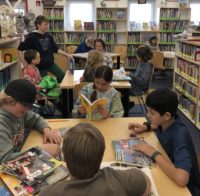
Read, Read, Read Some More
Friends Librarian, deana harragarra waters, loves books and reading. So do her students. When she asked our 5th graders about the value of reading, they had some great answers.
Read More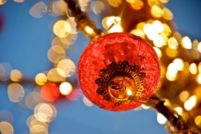
Lunar New year
Growing up in the Bay Area, Friends art teacher Bryn Pennington was exposed to a rich tapestry of cultural traditions. She felt humbled to experience the traditions of her closest friends, and today shares them with her students in Art Studio.
Read More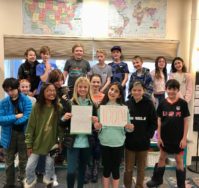
Friends Vision in Action
There are so many amazing things happening all around Friends School. Our 4 division directors recently shared the highlights in preschool, elementary, middle school and the Teacher Preparation Program.
Read More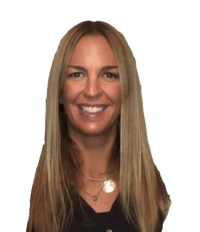
Volunteer Profile: Mindy Mullins
Meet Mindy Mullins, a busy Friends School mom of three kids, former trustee, veterinarian, parent council leader and a volunteer who pitches in whenever she sees a job that needs to be done. We’re in awe of her energy level and thankful for the time she dedicates to Friends School.
Read More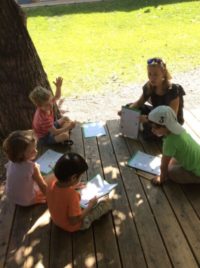
Mindfully connecting with science
Kindergarten teacher, Annika Nygren, loves science. Her eyes light up when she describes Kindergarteners as natural scientists, filled with curiosity and endless questions and theories. Integrating science with mindfulness resulted in a very interesting project.
Read More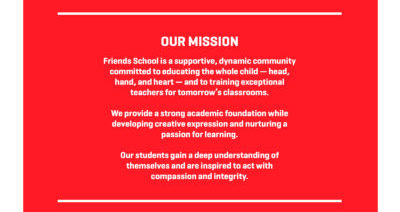
Friends School’s mission today…and in the future
by Jenefer Donovan, Friends School Community Board Chair
The new school year is now well underway and off to a great start! From day one I have been overwhelmed by the multitude of ways in which I have witnessed all the elements of Friends School’s mission in action…I have felt the energy and excitement of a dynamic community reuniting and reaching out to support one another and welcome our new families; I have been amazed by the wealth of team-building, collaborative projects and hands-on academic activities taking place in classrooms and I have been touched by the kindness of children connecting and helping others transition. I have felt the renewed energy of our wonderful teachers and met enthusiastic teacher candidates. I have admired the creative process of an elementary all-school collaborative art project and overheard middle schoolers display their passion for learning in eagerly asking when their full schedule would start! I have noticed the time taken in every grade for students to reflect on and share about themselves and listen to their peers, and for teachers and students to all get to know each other again; and I have seen the 5th graders already stepping up as leaders showing compassion and empathy for the new Kindergarteners helping them to feel safe, welcome and at home at Friends School.
These are just a few examples of the elements of the Friends School mission being put into practice, and all of this was in just the first week!
Before Honor started at Friends School, she began looking at everything here through the lens of the school’s mission and vision. One of her priorities in her first year was to “align decision-making practices with the mission and vision of the school”. She worked to bring Friends School’s mission and vision into everyday decision-making, keeping them front and center, putting children and mission first and consistently using the mission and vision to guide her and her leadership team. She encouraged all teachers and staff to do the same. Honor has also brought the 3 core principles of the vision to the forefront: ‘challenging minds, nurturing spirits and honoring individuality’. These provide the framework for all that the school does and, as you know, they have been chosen as the theme for the school this year.
In early September, the Friends School Community Board met for the first time this school year. I would like to thank all of our dedicated trustees for their hard work and commitment to the school. Over the summer the board read First Do No Harm, Progressive Education in a Time of Existential Risk by Steve Nelson and was inspired by his demonstration of “how education can nurture engaged and motivated children who actively discover their world and grow up to be good citizens”. Friends School has been the leader among Boulder schools in social and emotional education for over 32 years and we were proud to appreciate, while reading this book, that Friends School excels on every aspect of Nelson’s ‘Educational Bill of Rights’:
- Recognize the broad consensus that early childhood education should be primarily dedicated to free, imaginative play;
- Provide arts programming, recognizing that the arts are critical to all learning and to understanding the human experience;
- Provide ample physical movement, both in physical education classes and in other ways, recognizing that exercise enhances learning for all children;
- Exhibit awareness that children develop at different rates and different ways; that strict age or grade level standards and expectations are meaningless and damaging;
- Acknowledge the large body of evidence that long hours of homework are unnecessary and detract from children’s (and families’) quality of life;
- Exhibit genuine respect for all children;
- Honor a wide range of personalities and temperaments;
- Encourage curiosity, risk-taking and creativity;
- Cultivate and sustain intrinsic motivation rather than relying on elaborate extrinsic systems of rewards and punishments;
- Understand that brain research supports active learning, engaging all the senses;
- Understand that all children are intelligent in multiple ways and that all these intelligences should be honored and developed;
- Listen to each child’s voice, give them real experience in democratic processes, and allow them to express their individuality;
- Know each child well, appreciate the unique mix of qualities each child brings, and never demean, discourage or humiliate any child.
This year, Friends School Community Board has the important responsibility of creating the next strategic framework/plan for the school. Each of our board meetings throughout the year will include a strategic thinking work session. As we move through the process we will first examine our mission and vision, our “North Star”, guiding us through the journey of creation and implementation of the framework/plan. We will then gather input and data from the entire Friends School Community – teachers, staff, students, parents, families, trustees, founders, alumni parents and alumni students, before synthesizing and processing the data and formulating a strategic, flexible, forward-thinking framework/plan for Friends School.
I am looking forward to working on this process with the Friends School Community Board and our Strategic Planning Committee, led by alumni parent and trustee Anne Hunter. I am also excited to hear from all of you. Over the next few months the Strategic Planning Committee will reach out to all of you with various opportunities for you to provide your input – these could be surveys, small group vision meetings, or larger ‘dream-catcher’ meetings. We hope that you will participate in whichever ways work for you. Friends School is one of Boulder’s best independent schools because it has a strong community that cares.
Thank you all for being part of what makes Friends School such a special place for all our children.
Jenefer Donovan, Friends School Community Board Chair
If you would like more information on the role of the Friends School Community Board or are interested in being part of one of the Community Board committees, please email me at jenefer144@yahoo.com.
Read More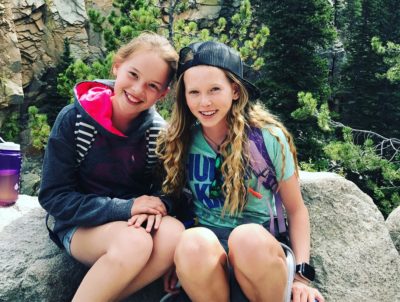
Challenging Minds, Nurturing Spirits, Honoring Individuality as we start a new school year at Friends School
Introduction by Jenefer Donovan, Friends School Board Chair with excerpts from our division directors (Jessie Vanden Hogen, Mandy Stepanovsky and Shelby Pawlina)
The first weeks of school are an exciting time of building the wonderful community and norms that carry us through the school year and for which Friends School is known. Across the school from Preschool, through the elementary and middle school years and into the Teacher Preparation Program, Friends School is already challenging minds, nurturing spirits and honoring individuality. We invite you to read these back-to-school updates from our program directors.
PRESCHOOL NEWS UPDATE (& Parent Reading Recommendations for all ages)

The Preschool is off to a great start in co-creating our new communities. We had a great New Parent Orientation, delightful day of Class Lemonades, and welcoming Home Visits. Included in this new batch of morning preschool families are some old friends and some new friends. We are growing connections and building trust with parents and children as we set out to create a very gentle, supportive and successful first school experience for the littlest ones. We take our jobs very seriously as we know the dynamics of the gifts and challenges in beginning the journey of separation.
With Head of School Honor Taft’s 4 trail-markers in mind – 1) Social and Emotional Literacy, 2) Creativity, Collaboration and Communication, 3) Rich Academics, and 4) Diversity, Social Justice and Service Learning – the preschool team picked up a few books for our summer reading. NOTE: Some books and authors definitely challenged our thinking and beliefs as well as gave us new perspectives! Our ongoing commitment to professional education and best practices is part of what we believe makes us the best preschool in Boulder.
- Being at Your Best When Your Kids are at Their Worst – Practical Compassion in Parenting By Kim John Payne
- From Teaching to Thinking By Ann Pelo and Margie Carter
- Hold on to Your Kids: Why Parents Need to Matter More Than Peers By Dr. Gabor Mate´
- It’s Ok Not to Share and Other Renegade rules for Raising Competent and Compassionate Kids By Heather Shumaker
- StoryMaking – The Maker Movement Approach to Literacy for Early Learners By Michelle Kay Compton and Robin Chappele Thompson
What we came away with were some themes to work with throughout the year ahead: Empathy – Boundaries – Community – Play
ELEMENTARY SCHOOL NEWS UPDATE


 “It looks so open in here!” “The school feels wonderful” “Everything is so light and bright.” These are just a few of the accolades heard as parents entered the elementary school for the first time this school year. It was a busy summer with painting, purging and preparing for students to arrive. The energy in the building has been full of anticipation and excitement for the year ahead. We have only been in school for a short time, but there is already much to celebrate.
“It looks so open in here!” “The school feels wonderful” “Everything is so light and bright.” These are just a few of the accolades heard as parents entered the elementary school for the first time this school year. It was a busy summer with painting, purging and preparing for students to arrive. The energy in the building has been full of anticipation and excitement for the year ahead. We have only been in school for a short time, but there is already much to celebrate.
We are already challenging minds through:
- Assignments and projects focused on celebrating our summer vacations and setting goals for the year ahead.
- 4th and 5th grade Invention Convention projects
- Implementation of the new math curriculum
- Benchmark testing in literacy and math
- Teacher participation in a day-long Design Thinking workshop with Future Design School that prepared them to bring design thinking into their classrooms this year.
We nurture spirits through:
- Welcoming our new Kindergarten friends and their families to the community, and new friends in other grades too.
- Implementation of Responsive Classroom practices in our K/1 classrooms after teachers participated in a week-long training. With the new implementation of full-day Kindergarten throughout Colorado, we continue to be the most intentional, nurturing, and best Kindergarten in Boulder.
- Time taken in each classroom to set class norms, create class constitutions and engage students in creating the type of learning environment they would like to have.
- Start of the 8 week parent Mindfulness workshop
We are honoring individuality through:
- The creation of a “cool down” space in the old copy room. This is a place where students can go to quietly draw, or jump on a trampoline when they need a moment to reset during the school day.
- Projects and assignments aimed at sharing individual interests/experiences as students get to know each other at the start of the school year.
- The creation of learning plans to further differentiate learning for students who need specific accommodations across subject areas.
- The exploration and celebration of Howard Gardner’s multiple intelligences in 3rd Grade
MIDDLE SCHOOL NEWS UPDATE

The middle school has grown by over 50% this year, and the energy in the building is exciting and inspiring! This incredible growth is a great demonstration of the need for a new, more progressive Boulder Middle School option.
Challenging Minds
- Summer book discussions – Each grade had a book to read over the summer that Diane chose specifically for its appeal to middle schoolers. One parent of an 8th grader reported that her child LOVED the book so much…a first for him! Each class discussed their opinions of the book, character development, plot, and other aspects of the book. It was a nice way to begin an academic conversation while getting to know one another.
- Problem- solving activities – Remember the game of Mastermind with the colorful pegs? At the middle school there is a similar game that we play…Pico-Firme-Bago in which students have to guess a set of numbers in a particular order while being given feedback of the accuracy of their guesses. The cheers that come from the homeroom when the correct number is finally guessed/ revealed are always enthusiastic. On a physical level, the popular camp game Human Knot got students problem-solving in a different way. Nuno led good reflective sessions on the process, connecting this to group work and problem-solving in general.
Nurturing Spirits
- Camping Trip to Rocky Mountain National Park -Temple Grandin has discussed the importance of leveraging the skills of visual learners and making sure our children learn the basics of cooking, shopping, and fixing things- engaging in hands-on learning as much as possible. Our trips program is underpinned by these expectations. In the days before the trip, students developed the menu for the trip, went grocery shopping for the ingredients (comparing products, figuring out amounts, and managing a budget), and learned how to set up/ dismantle the tents independently. On the trip, every student had an opportunity to be on a cook team and clean up team. For some students, these were first time events. There is something about doing things that expand our comfort zones that builds a greater and more nuanced sense of self, increased self-awareness and self-advocacy. In middle school, this is what we are going for.
Honoring Individuality
- All About Me – One of our first central activities is the “All About Me” assignment that culminates in a Gallery Walk before the camping trip. Each student creates a poster of their design and presentation that includes information about each person’s personal heroes, favorite books, important event in their lives, etc. These are great ways to get to know one another as well as serving as jumping in points for teachers to connect curriculum with student experiences. These will decorate the homeroom and hallways.
The school year is off to an incredible start, and we can’t wait for a full year of challenging minds, nurturing spirits, and honoring individuality in this incredible school community.
Read MoreFriends new NEW math
by Erika Norman, Friends School K-5 Math Teacher
Math education has changed drastically in the years since most of us, as parents, were in classrooms, and in that time there has been a wealth of research about best practice as well as brain development around math learning. At Friends, we are constantly researching this best practice. We offer yearly Kindergarten and 1st grade parent math nights, we share updates in classroom newsletters throughout the year, and we spend each day cultivating a growth mindset for our young mathematicians through the work of Stanford’s Dr. Jo Boaler. Jo is one of the world’s leaders in math education and I was fortunate to attend her workshop Mathematical Mindsets at Stanford University last spring. Dr. Boaler dispels the notion of having a math brain or not a math brain. At Friends we believe that all students are mathematicians, writers, readers, scientists, and most importantly thinkers. All of them are capable of success with the right mindset and experiences.
Friends School students are asked more than just how to complete a mathematical procedure, but also how to apply their math knowledge in unique situations. They see math in the world around them, not just on a worksheet page. We strive to make real-life math connections for our students through hands-on opportunities to use their math understanding. A few such examples of this are the 4th and 5th grade coffee cart project, our current Friday fraction cooking projects, creating a 3-D Polyhedraville to augment the 3rd grade curriculum, using Intooba building kits for engineering challenges, and linking a 1st grade bird study to our measurement standards. At Friends, math relates to every day experiences
In March, Friends made the exciting decision to adopt a new math curriculum to augment the good work we are already doing. This past Fall and winter all of the lead elementary teachers, with Mandy and I, spent many hours after school looking at curriculum, meeting with companies, testing out lessons from various curriculum, talking to other educators and diving deeply into what we wanted for our kids and school to meet the needs of our students. We were looking for a curriculum that had a clear scope and sequence and one that met all the standards at every grade level from Kindergarten through 5th grade. We wanted a curriculum that was usable for teachers, had resources for families and students, and contained lots of manipulatives and visual models to help students build that conceptual understanding that research shows is vital for success in higher math. Finally, we wanted to make sure that whatever curriculum we adopted was rigorous in not only problem solving, but also in computational fluency.
![]() After much deliberation, we have decided to adopt Bridges in Mathematics, a K-5 math curriculum from The Math Learning Center. Bridges has been reviewed nationally and ranks highly in all the categories we were seeking: focus and coherence, usability, rigor and mathematical practice. Additionally, we were impressed by the resources for parents and families to help educate and support their child’s math learning, as well as a professional development site for educators to continue to explore best practice for our young learners. Finally, we were excited that the curriculum has built-in curricular components for our math learners that need extension and a well-developed intervention program for our struggling mathematicians.
After much deliberation, we have decided to adopt Bridges in Mathematics, a K-5 math curriculum from The Math Learning Center. Bridges has been reviewed nationally and ranks highly in all the categories we were seeking: focus and coherence, usability, rigor and mathematical practice. Additionally, we were impressed by the resources for parents and families to help educate and support their child’s math learning, as well as a professional development site for educators to continue to explore best practice for our young learners. Finally, we were excited that the curriculum has built-in curricular components for our math learners that need extension and a well-developed intervention program for our struggling mathematicians.
All the elementary lead teachers, Mandy, and I will be trained in the Bridges curriculum in May and August, with ongoing touch-points throughout the year. Continued professional development will occur throughout next school year to ensure that we are successful with this transition. It is an exciting time and we are thrilled that we were able to adopt this curriculum, which will blend so nicely into the work we have already been doing and make it just that much better for our students.
We look forward to bringing this exciting curriculum into our classrooms and introducing it to our student mathematicians. If you are interested in learning more about Bridges, you can visit https://www.mathlearningcenter.org/ or feel free to reach out to me, Honor, Mandy, or Caroline Long who has piloted Bridges in her classroom for the past year.
Read More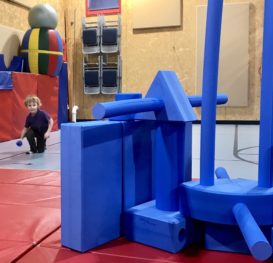
Big Blue Blocks
by Chris Hollinger, PE Teacher & Director of AfterCare and Enrichment Programs
The Big Blue Blocks (BBBs) are here, and are capturing hearts and minds of the Friends School community! During the past week and a half, grades Kindergarten through fifth have had the opportunity to become familiar with this new and awesome addition to our playground. Each grade was separately introduced to the BBB’s. This served several purposes, including providing a low-stress environment when first using the equipment, age-appropriate comprehensive and inclusive discussions about safety and respecting school equipment, free play with like ages, and getting all kids involved in the pack-up process (cleaning up and storing BBBs).
 Already the kids have been using the BBB’s to:
Already the kids have been using the BBB’s to:
- create forts with water systems
- organize and play their own sports games
- create and problem solve ball ramps
- engage in fair-trading
- build items from speeder bikes to lawn mowers to giant cats
We are excited to introduce the BBBs to the community at large! You will see your child engage in unstructured, child-directed free play. And when weather permits, we’ll bring them outside.
This kind of play is critical to a child’s intellectual, social, physical and emotional development. The three core elements to the BBB’s are: Loose parts, a manipulable environment and “Play Associates” (“Play Associates” are your loving teachers and staff, trained to oversee an open setting where children can direct their own play, while maintaining a safe and welcoming environment). A changing collection of moveable or “loose” parts lets children make each play session a new experience. Children play most creatively in settings that they can manipulate..
Warning: With Big Blue Blocks, children are highly likely to have fun and learn!
Enjoy this short video of our students engaged in play with the BBB’s.

Third graders join Antarctica Expedition
by Meg Hansen, Director of Marketing and Communications
Third grade teacher Caroline Long is always looking for the next great adventure and thinking of ways she might weave it into an interesting lesson for her students. It’s just one of the things our students and parents love about Caroline and what makes her a great teacher.

3rd graders during one of their weekly video calls with the ship
Back in December, the great uncle of one of Caroline’s students shared something that sparked her interest. A 45-day expedition to Antarctica was about to take place and her students had the chance to be part of it. Through modern technology, a crew of scientists and marine exploration experts were allowing students around the world to track and interact with them via weekly video conferences as they boarded the S.A. Agulhas II on the Weddell Sea Expedition in Antarctica.
This program, offered through Reach the World, a nonprofit global education organization out of New York, connects schools with explorers and scientists around the world. It was the perfect segue to Caroline’s upcoming units on weather, explorers and other cultures. She started researching and even studied for a technical test she had to take over winter break in order to be considered for the program. She passed and she and her third graders were accepted into the program.
Caroline picked this particular expedition to share with her students for two reasons (with its connection to her curriculum):

One of the live video calls with the ship
- Environmental impact– The explorers were looking at the Larsen Sea ice shelf that broke off near the Weddell Sea in Antarctica in 2017. In particular, they were studying global warming’s effect on Antarctica and the broken ice shelf’s impact on water levels, the environment and the rich sea life that exists in this region. (Curriculum link: The class is studying weather and, in particular, they are looking at how climate change impacts weather and changes the overall climate in the U.S.)
- Finding the Endurance Shipwreck– Additionally, these explorers hope to use Autonomous Underwater Vehicles (AUV) to be the first to find Sir Ernest Shackleton’s ship Endurance, which was lost in an ice floe off Antarctica in 1915 and never found again. All members of Shackleton’s crew survived, but all missions to find the ship have failed. (Curriculum link: The class is studying explorers, namely the Spanish and French explorers who settled in Colorado, their country of origin, and what it took to travel all the way to Colorado.)

Weekly Expedition Notes from the ship
Caroline receives an email from the ship every Friday and on the following Monday the students learn of their assignment and plan their weeks around the call with a variety of experts on the expedition. Soon the students made connections with Holly, the main scientist on the ship, and began following her blog (many of our students used their time during Readers Workshop to read about the expedition). John Shears, one of the scientists on the ship, offered his thoughts on the expedition and the kids surprisingly learned that John won the Polar Medal from Her Majesty Queen Elizabeth II. Wow! The students began keeping logs of what they were learning, and a list of questions and what they wanted to learn from the explorers. They wanted to know a lot. For example:
- What makes this expedition different from Shackleton’s Endurance and what would happen if the SA. Agulhas II got stuck just like the Endurance?
- How on earth do they get all that safety equipment and people to Antarctica?
- How do planes stop when they are landing on a sheet of ice?
- What were the scientists learning about wildlife in Antarctica?
- What does Antarctica have to do with Mars?
- What are the explorers learning about other cultures since they are mostly just encountering animals?
- We know a lot about collaboration at Friends School, but why is collaboration in Antarctica so important?
- Tell us where flexibility, adaptability and unpredictability lessons were part of this expedition?
The answers are fascinating! See one of our third grader experts who would be happy to share answers to these questions and all they’ve learned about this project. (Teaser: You can’t touch or hug a penguin in Antarctica unless it’s on the runway, and NASA is studying Antarctica in the hopes it will help astronauts one day live on Mars.)
The students are particularly excited about their last video conference which will be a YouTube live stream with John Shears reflecting back on everything they learned on their voyage: has the climate changed and what are the effects, has the ice gotten thinner, and…did they find the Endurance? We can’t wait to find out!

Alumna Phoebe Norman shares stories of her trip to Africa with 3rd graders!
It turns out modern-day explorers are all around us.You don’t have to go to Antarctica to be an explorer. Visits from two Friends alumni will bring modern-day expeditions right into the classroom. Phoebe Norman (Friends School Fifth Grade Class of 2011) visited 3rd grade last week, and Michael Hansen (Friends School Fifth Grade Class of 2007) will visit soon to share their own experiences of exploring the world and learning about new cultures. Through Where There Be Dragons, Phoebe went to Senegal and Guinea for three months and stayed with two different host families. She shared with the students about adapting to a new religion, living in different homes, eating/cooking different food in different ways, and learning new languages. The kids were all surprised to hear that in some places there wasn’t technology or access to WIFI and phones and that she was only able to communicate back home a few times via email. They loved seeing her pictures and learning about a new country and her experiences

Alumnus Michael Hansen at the summit of Mt. Kilimanjaro.
as an explorer. Michael will be visiting the students in March to talk with them about his annual college trips to Argentina to study their culture and business economy. After graduating from college, he traveled to Tanzania to climb Mt. Kilimanjaro where he was immersed in the African culture and completed this expedition that was both physically and mentally challenging. There were challenges and surprises along the way and times where he needed to adjust the course of his travels. But all of them were worth it for the people he met, the places he saw, and some of the unidentifiably delicious food he ate.
Whether it’s Antarctica or Africa or just around our beautiful state, Caroline is always challenging her students to reach beyond their own cultures and learn more about our larger world. She hopes the Weddell Sea Expedition project and the real-life expeditions of their Friends classmates who walked our halls long ago spark a desire to continue to explore and discover new lands and cultures. It’s easy to search online for any place on earth these days. While technology can help us explore different lands and cultures, true exploration happens by actually physically traveling to lands near and far and immersing yourself in the culture.
Which one of our current third graders’ future expeditions will inspire the next generation of Friends students to explore our greater world?
Read More